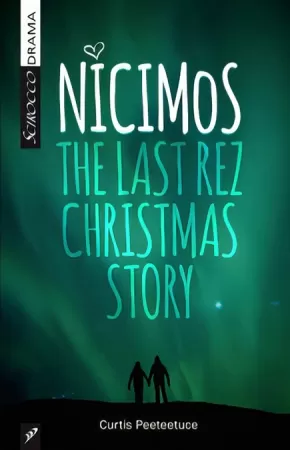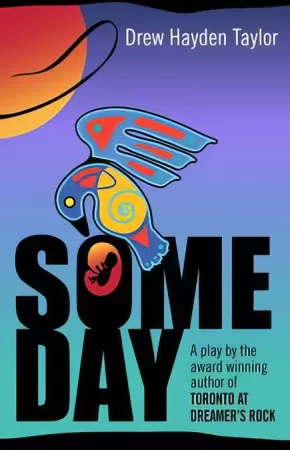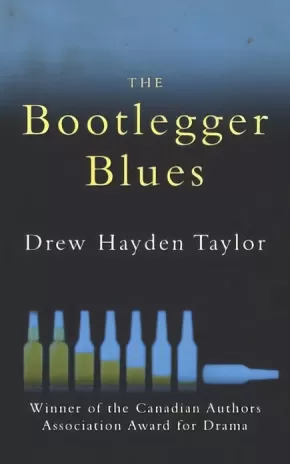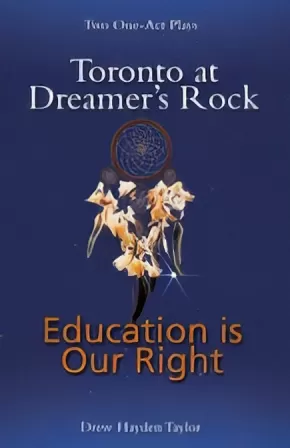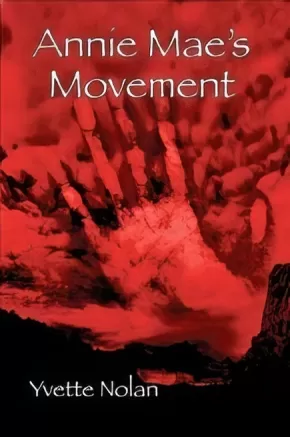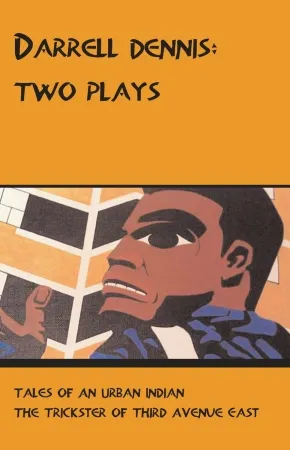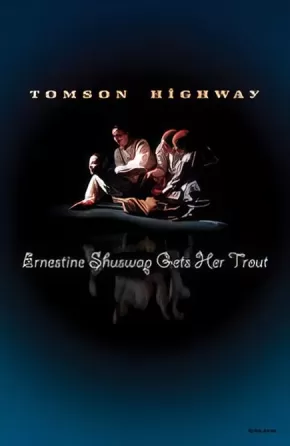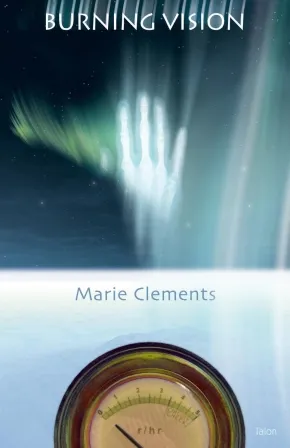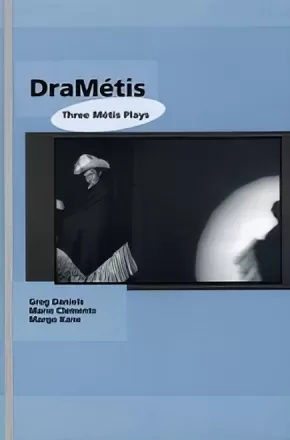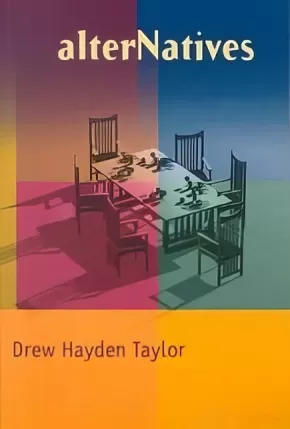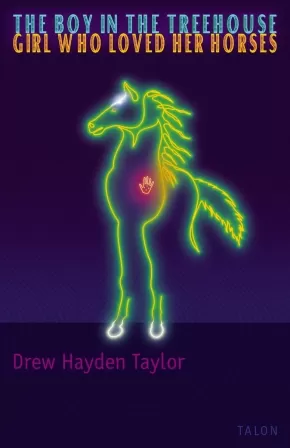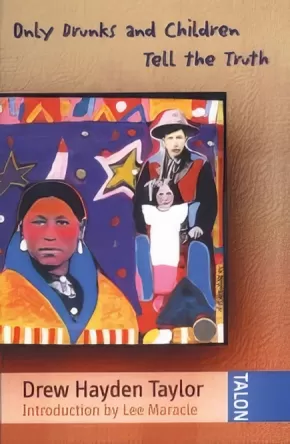Theatre
Synopsis:
This Christmas season, things have gone awry for the kohkoms of Kiwetinohk. Clare Bear is engaged to be married, Zula Merasty is moving off-reserve and Sihkos Sinclare is in jail. It all comes to fruition at Clare's stagette. Nicimos is dedicated to the memory of Lacy Morin-Desjarlais.
Reviews
“Nicimos means sweetheart in Cree and that’s what this play is. A warm-hearted sweetheart with depth and charm and a great sense of humour. The final installment of the Rez Christmas series finds Saskatchewan Native Theatre Company director-writer Curtis Peeteetuce in outstanding form. His words are a gift to the actors and his generosity is reciprocated by incredibly satisfying performances. There’s more here than just a play, you realize. It’s an example of the power of theatre to unite, heal and humanize by appealing to First Nations audiences and the broader community.” – Saskatoon Star Phoenix
Educator Information
This book may be useful for courses in English language arts, creative writing, and performance arts for grades 11 to 12 students, as well as for students at a college/university level.
Caution: references to sexual and alcohol abuse and some Indigenous stereotypes.
Additional Information
72 pages | 5.50" x 8.50"
Synopsis:
Someday is a powerful play by award-winning playwright Drew Hayden Taylor. The story in Someday, though told through fictional characters and full of Taylor's distinctive wit and humour, is based on the real-life tragedies suffered by many Native Canadian families.
Anne Wabung's daughter was taken away by children's aid workers when the girl was only a toddler. It is Christmastime 35 years later, and Anne's yearning to see her now-grown daughter is stronger than ever.
When the family is finally reunited, however, the dreams of neither women are fulfilled.
The setting for the play is a fictional Ojibway community, but could be any reserve in Canada, where thousands of Native children were removed from their families in what is known among Native people as the "scoop-up" of the 1950s and 1960s. Someday is an entertaining, humourous, and spirited play that packs an intense emotional wallop.
Additional Information
142 pages | 5.50" x 8.50" | Paperback
Synopsis:
This comedy by the author of Toronto at Dreamer's Rock and Education Is Our Right is about love, family, and what to do with too much beer. Set on a reserve, it follows the plight of Martha, a church-going, teetotaling woman who finds herself stuck with 143 cases of beer after a church fundraiser fails. She decides to bootleg the beer, to the horror of her son Andrew, nicknamed Blue, who is a special constable on the reserve.
Meanwhile, Andrew has fallen for a young woman he thinks is his cousin, and his sister Marianne is bored with her "Indian Yuppie" husband and finds herself attracted to a handsome dancer at the powwow.
The pace is fast and vigorous in this romantic situation comedy.
Reviews
"It's sole purpose is to make us laugh and it succeeds... It should be no surprise that this is a comedy of character and situations. Herein lies the strength of Taylor's writing. He has vividly created some of the characters. We know from the first moment that we are going to be entertained. Taylor has invited us into his home an offered us a glimpse of Reserve life through a uniquely comic eye."— The Canadian Journal of Native Studies.
Additional Information
94 pages | 5.00" x 8.00"
Synopsis:
A funny yet thought-provoking play about identity politics. Cast of 4 men and 1 woman.
Synopsis:
In these two one-act plays, Drew Taylor delves into the past and speculates about the future as he examines the dilemmas facing young Native Canadians today.
Toronto at Dreamer's Rock is a moving portrayal of a teenage boy who is torn between the traditions of his people, which he only vaguely understands, and the lure of modern life. His magical encounters with two members of his tribe - one from 400 years in the past and one from the future - make him aware of how little he has thought about what it means to be an Indian.
Education is Our Right borrows from the familiar story of Charles Dickens' A Christmas Carol, but in this version the spirits of Education Past, Present and Future attempt to show the Minister of Indian Affairs the error of his ways.
Drew Taylor combines humour, passion, spirituality, and tough realism to create a hopeful vision of the future that will appeal especially to young adult readers. Both plays have toured extensively to schools in Ontario and Quebec.
An Ojibway from the Curve Lake First Nations in Ontario, Drew Hayden Taylor has worn many hats in his literary career, from performing stand-up comedy at the Kennedy Center to being Artistic Director of Canada’s premiere Native theatre company, Native Earth Performing Arts.
He has been an award-winning playwright, a journalist/columnist, short-story writer, novelist, television scriptwriter, and has worked on over 17 documentaries exploring the Native experience.
Synopsis:
Irreverently funny and brutally honest Governor General's Award-winning play about loss and redemption. Cast of 2 women and 4 men.
Grades 10-12 English First Peoples resource for the units Childhood through the Eyes of Indigenous Writers and Further Steps toward Reconciliation.
96 pages | 5.50" x 8.50"
Synopsis:
Annie Mae''s Movement explores what is must have been like to be Anna Mae Pictou Aquash, a woman in a man''s movement, a Canadian in America, an American Indian in a white-dominant culture. This play looks for the truth by examining the life and death of this remarkable woman.
Educator Information
Recommended Grades: 10-11.
Synopsis:
Tales of an Urban Indian is a one-person play that follows the trials and tribulations of Simon Douglas, a young First Nations man who moves from his rural reservation to the big city of Vancouver. This dark comedy examines the issues of race, identity, and assimilation that drive young Indigenous men to self-destruction.
In The Trickster of Third Avenue East, Roger and Mary are spiralling out of control but are too scared to let each other go. Enter J.C., a mysterious visitor who turns their lives upside down and forces them to confront their darkest secrets. J.C. pushes Roger and Mary into the realm of the supernatural and past the brink of sanity.
Additional Information
134 pages | 5.45" x 8.40" | Paperback
Synopsis:
Based on a deposition signed by 14 Chiefs of the Thompson River basin on the occasion of a visit to their lands by Canadian Prime Minister Sir Wilfrid Laurier in 1910, Ernestine Shuswap Gets Her Trout is a ritualized retelling of how the Native Peoples of British Columbia lost their fishing, hunting and grazing rights, their lands, and finally their language without their agreement or consent, and without any treaties ever having been signed. It is one of the most compellingly tragic cases of cultural genocide to emerge from the history of colonialism, enacted by four women whose stories follow each other like the cyclical seasons they represent.
Written in the spirit of Shuswap, a “Trickster language†within which the hysterically comic spills over into the unutterably tragic and back, this play is haunted by the blood of the dead spreading over the landscape like a red mist of mourning.
Synopsis:
A Thousand Supperless Babes: The Story of the Métis is a theatrical play and interactive Compact Disc compilation, revealing the history of the Métis through story, song and dance. Set in New York City, far from the Métis homeland, A Thousand Supperless Babes tells a poignant history of a Nation, unfolding using the stories and experiences of Métis individuals and the reminiscences of Honore Jaxon, one of Louis Riel's secretaries. Through the use of cast monologues, this play promotes and preserves the tradition of Métis storytelling, as monologues have been created using stories of Métis history told to cast members by their ancestors. The compilation includes the play's script in both printed and electronic formats and an electronic Flash Presentation of historical images to be used throughout the performance. The compact disc also includes the musical score, performed by singer/songwriters Andrea Menard and Don Freed, accompanying sheet music, and other information that can be used by teachers and drama instructors to produce and perform A Thousand Supperless Babes: The Story of the Métis. Depending upon the theatre group or drama class, the script can easily be modified to include new stories based on cast member's family stories or other significant events in Métis history.
Grade Level: Middle Years/Secondary/Post Secondary/Adult
Synopsis:
Marie Clements’s play sears a dramatic swath through the reactionary identity politics of race, gender and class, using the penetrating yellow-white light, the false sun of uranium and radium, derived from a coal black rock known as pitchblende, as a metaphor for the invisible, malignant evils everywhere poisoning our relationship to the earth and to each other.
Burning Vision unmasks both the great lies of the imperialist power-elite (telling the miners they are digging for a substance to “cure cancer” while secretly using it to build the atomic bombs that devastated Hiroshima and Nagasaki); and the seemingly small rationalizations and accommodations people of all cultures construct to make their personal circumstances yield the greatest benefit to themselves for the least amount of effort or change on their part. It is also a scathing attack on the “public apology” as yet another mask, as a manipulative device, which always seeks to conceal the maintenance and furtherance of the self-interest of its wearer.
Clements’s powerful visual sets and soundscapes contain curtains of flames which at times assume the bodies of a chorus passing its remote judgment, devoid of both pity and fear, on the action: a merciless indictment of the cross-cultural, buried worm of avarice and self-interest hidden within the terrorism of the push to “go with the times,” to accept the iconography of a reality defined, contextualized and illuminated by others.
Marie Clements writes, or, perhaps more accurately, composes, with an urbane, incisive and sophisticated intellect deeply rooted in the particulars of her place, time and history.
Cast of five women and 12 men.
Reviews
“Clements covers a lot of ground, but she knows her territory and travels it deftly… Clements dips her pen in numerous cross-cultural references, from cherry trees to caribou to Hank Williams, and writes with a magical irreverence that highlights this tragic saga. Her rich poetic style evokes parallels between Japanese and native myths – not unlike Yeats’ Noh Plays where Celtic and Japanese myths meld – finding connection through ancient truths and the power of the soil, except in this case the soil is literally explosive.”– Quill & Quire
"I remember reading this play in my undergrad and being shocked and impressed at how much theatre could do and be. This was a far cry from the kitchen sink dramas I had already (naively) decided formed the bulk of contemporary Canadian theatre. Far from the confines of the kitchen, Burning Vision travels across the globe and through time, offering a complex portrait of interconnectedness, shared trauma, and shared responsibility for healing. Fifteen years after it premiered in Vancouver and the subject matter is still, sadly, “of the moment” as we wrestle with climate change and isolationist politics. Requiring a diverse cast to fill parts such as the Dene Seer and Tokyo Rose, and requiring a flexible space so it can be staged in the round, there is no doubt that this play can be challenging. But it is challenging in the best sense of the term, in that it is full of possibilities and invites creative minds in to tackle the important challenges of our day. - Lisa, from PledgeProject
Additional Information
128 pages | 5.50" x 8.50" | Paperback
Synopsis:
DraMétis is the first anthology to focus on the emerging discipline of Métis drama. The pieces have all been previously produced and highlight the diversity of Métis drama being written and performed in Canada.
Synopsis:
A very liberal contemporary couple, Angel, an urban Native science fiction writer, and Colleen, a "non-practising" Jewish intellectual who teaches Native literature, hosts a dinner party. The guests at this little "sitcom" soir are couples that represent what by now have become the cliche'd extremes of both societies: Angel's former radical Native activist buddies and Colleen's environmentally concerned vegetarian / veterinarian friends. The menu is, of course, the hosts, respectful attempt at shorthand for the irreconcilable cultural differences about to come to a head during the evening: moose roast and vegetarian lasagna.
Like all of Drew Hayden Taylor's work, alterNatives manages to say things about "Whites and Indians" that one is not supposed to talk about, it digs up the carefully buried, raw and pulsing nerve-endings of the unspeakable and exposes them to the hot bright lights of the stage. That he does so with a humour that the politically correct among his audiences continue to miss entirely beneath the sound and fury of their own self-righteous indignation is a measure of his immense talent as a dramatist. In the end, the play is not about cultural differences at all, but instead constitutes a full frontal attack on the personal qualities the sitcom holds most dear and pushes hardest at its audiences: Taylor actually has the temerity to suggest that neither "attitude" nor "sincerity" are enough to address basic human issues, no matter which side of the cultural fence the characters are on. And that's hard for the pushers of what is considered a globally enlightened culture to take.
Cast of 3 women and 3 men.
Synopsis:
In this collection of two plays about the process of children becoming adults, Drew Hayden Taylor works his delightfully comic and bitter-sweet magic on the denials, misunderstandings and preconceptions which persist between Native and Colonial culture in North America.
In “The Boy in the Treehouse,” Simon, the son of an Ojibway mother and a British father, climbs into his half-finished tree house on the vision-quest his books say is necessary forhim to reclaim his mother’s culture. “It’s a Native thing,” he informs his incredulous father (who tells him he’d never heard of such a thing from his wife): “Only boys do it. It’s part of becoming a man.” Of course, what with the threats of the police, the temptation of the barbeque next door, and the distractions of a persistent neighbourhood girl, Simon probably wouldn’t recognize a vision if he fell overit.
“Girl Who Loved Her Horses” is the Native name for the strange and quiet Danielle from the non-status community across the tracks, imbued with the mysterious power to draw the horse “every human being on the planet wanted but could never have.” She is and remains an enigma to the people of the reservation, but the power of her spirit remains strong. Years later, a huge image of her horse reappears, covering an entire side of a building in a blighted urban landscape of beggars and broken dreams. The eyes of her stallion, which once gleamed exhilaration and freedom, now glare with defiance and anger. Danielle has clearly been forced to grow up.
With these two plays, Taylor rediscovers an issue long forgotten in our “post-historical” age: the nature of, and the necessity for, these rites of passage in all cultures.
Additional Information
160 pages | 5.50" x 8.50" | Paperback
Synopsis:
Only Drunks and Children Tell the Truth is the emotional story of a woman’s struggle to acknowledge her birth family. Grace, a Native girl adopted by a White family, is asked by her birth sister to return to the Reserve for their mother’s funeral. Afraid of opening old wounds, Grace must find a place where the culture of her past can feed the truth of her present. Cast of 2 women and 2 men.
Reviews
“…this play is a very tender, engaging look at two strangers learning to be sisters…witty one-liners and snappy dialogue has crafted likeable, real characters…brings a satisfying sense of closure to the struggles of Barb and Janice/Grace. It is a welcome ending, one that reflects hope for the future – not only for these two sisters , but also for all the others who have yet to find their way home.” - Cheryl Isaacs, Aboriginal Voices.
Awards
- James Buller Award for Playwright of the Year, 1997
- Dora Mavor Moore Award for Outstanding New Play, Small Theatre Division, 1996.
Educator Information
Grades 11-12 BC English First Peoples resource for the units Yes, there is Funny Stuff - Humour in First Peoples Literature and What Creates Family?
Additional Information
112 pages | 6.00" x 9.00"

